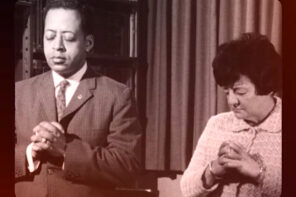And so the world still turns. No rapture, no living hell, no Armageddon. We are where we were before the weekend with no signs of Christ’s return, facing the same ol’ same ol’: Arnold’s love child, Newt’s latest flame-out, life without Oprah.
At the moment, Family Radio offices are closed and Harold Camping, the self-made millionaire-cum-biblical prognosticator who set the media ablaze with his doomsday discourse, is silent.
We can read about all those who believed his prediction about the end of the world and took action—long family journeys in the minivan, disappointment about not entering a better world than this, grudging acceptance of the fact that life as we know it goes on—as well as numerous more humorous accounts, if not outright ridicule, of what to make of all this silly, over-the-top religious nonsense.
Perhaps this might be a nice teachable moment to reflect on all this—not nonsense at all, but rather an illuminating cultural moment that reveals an awful lot about the role of religion in our crazy world. What are the key takeaways from the “mediapocalypse”? Here are five for your consideration:
1. Old white male Christian religious fanatics sure get our attention.
Even as American society grows more religiously diverse and increasing numbers prefer spiritual freedoms to affiliation with one religion, all it takes is one older white fundamentalist Christian proclaiming some message of violence or hatred to a create a media frenzy and get the world talking about theology on the fringes (which can, in the right political circumstances, take the fringe to the heart of the mainstream). Terry Jones is one recent example with his attack on Islam but the list is long and includes such figures as Pat Robertson, James Dobson, and Jerry Falwell.
2. The Christian fundamentalists are not alone in this religious obsession.
In fact, most religions project end-of-the world scenarios.
Taking a step back from the current focus on Camping and thinking more comparatively, it is clear that most religious movements and communities incorporate some form of eschatology—knowledge of end times—into their worldviews. Let’s face it, Camping would fit right in with the early followers of Christ who also believed in the imminent end of the world.
But even beyond the confines of the familiar preoccupation with apocalypse in the Abrahamic, monotheistic faiths, examples from other religions abound. In Hindu mythology the God Shiva is a world destroyer and, like Buddhism, expresses a cosmic view of periods of world destruction and world renewal.
Closer to home, the pan-Indian Ghost Dance movement included a prophesy that the current world would end and the whites would disappear. And let’s not forget about that Mayan calendar which many believe foretells the world’s destruction in 2012.
3. Americans are fixated on world destruction.
Forget about what the religions of the world say about the end, just look at the incredible bounty of apocalyptic images and storylines in popular culture to see a widespread societal obsession with the end of the world.
Think of End of Days or Armageddon; more recently there’s been 2012 and Battle: Los Angeles. The list goes on and on: Independence Day, The Day the Earth Stood Still, The Day after Tomorrow, and far too many others to name.
Why this fixation? No doubt multiple reasons exist, including America’s love of violence (what could provide more awe-inspiring scenes of violence than movies depicting the apocalypse?); America’s need for heroes and villains (these films are generally framed as good v. evil, even if the evil is global warming or huge meteors or space aliens or zombies); and, perhaps, more deep-rooted existential anxieties about mortality, finitude, and death (though in these films the shift is away from the personal to human society writ large, away from struggling with individual death and toward a larger cosmic frame that encompasses world destruction and the death of humanity). In this context, these films are as much about religious sensibilities as entertainment.
4. Religion is not rational, most of the time.
Another lesson to learn here is tied to the naïveté of the non-believers who keep asking about Camping’s followers, “why do they believe this silliness?” This, to me, is like asking: “why do all those Christians believe Christ was resurrected?”; or: “why do Hindus believe in reincarnation?”; or: “why do Jediists believe in The Force?”
It is simply missing the point of the power of religion to bring a rationalist frame of mind to religious phenomena.
Camping’s followers are not all from the poorer classes who are seeking some kind of radical upheaval that will finally give them their heavenly rewards; they are not all psychologically delusional and have personality disorders that draw them to wacky beliefs and predictions; they are not simple-minded, ignorant conformists who easily follow the authority of charismatic leaders, or a leader with a charismatically compelling message. While the New Atheists would like human beings to lose childish, supernatural superstition and replace it with more realistic, scientific-based acceptance of the world—a position aligned with Freud’s view of religion as an illusion—the sad truth (maybe happy truth?) is that irrational religion rules this world.
Like DNA, religious motivations, commitments, investments, desires, etc. are built into and elemental to human life.
5. This is not the end of the end.
America has a long history of producing doomsday theology and predictions of world destruction.
Indeed, it appears there is something rather generative about end of world scenarios, something that stirs the imagination, brings people together, confirms certain moral absolutes, and leads to the possibility of ultimate transcendence.
The future, ironically, is bright—and ripe for ongoing prophecies about the end of time.
***
Update: According to Camping, the Rapture did indeed occur, only it was “spiritual”:
Through chatting with a friend over what he acknowledged was a very difficult weekend, it dawned on him that instead of the biblical Rapture in which the faithful would be swept up to the heavens, May 21 had instead been a “spiritual” Judgment Day, which places the entire world under Christ’s judgment, he said.
The globe will be completely destroyed in five months, he said, when the apocalypse comes. But because God’s judgment and salvation were completed on Saturday, there’s no point in continuing to warn people about it, so his network will now just play Christian music and programs until the final end on Oct. 21.
“We’ve always said May 21 was the day, but we didn’t understand altogether the spiritual meaning,” he said. “The fact is there is only one kind of people who will ascend into heaven … if God has saved them they’re going to be caught up.”




